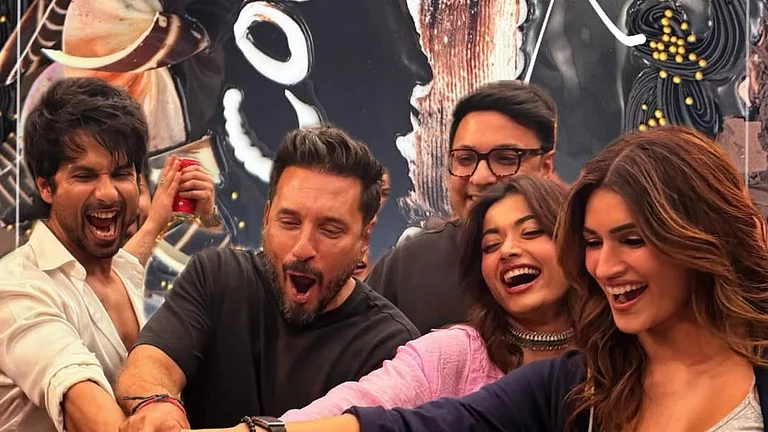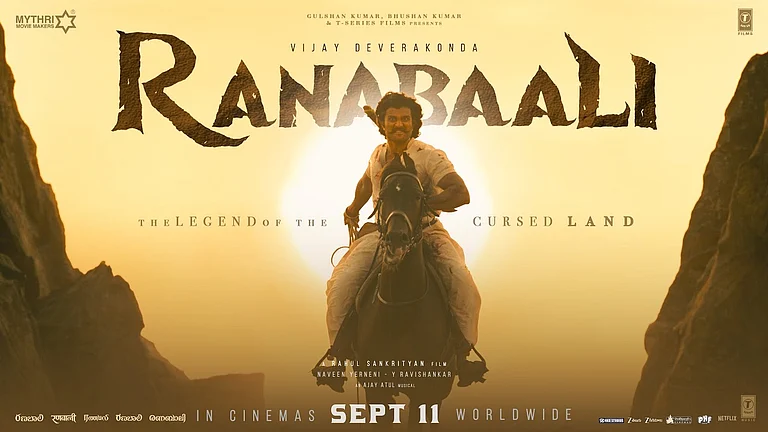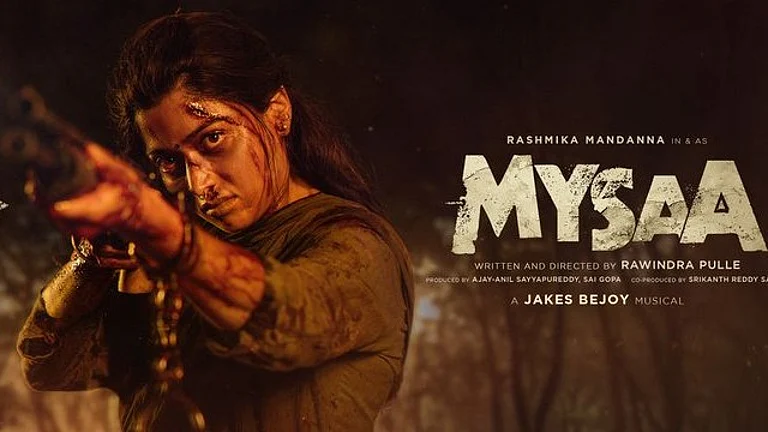
The Girlfriend (2025) is a Telugu film written and directed by Rahul Ravindran.
The movie features Rashmika Mandanna, Dheekshit Shetty & Anu Emmanuel in the main lead roles along with Rao Ramesh and Rohini.
The film revolves around a young woman Bhooma, exploring independence, compatibility and self-discovery during college as she gets involved with Vikram, a controlling boyfriend.
A couple of weeks ago, Rashmika Mandanna appeared in Thamma (2025), the latest in the Maddock horror-comedy franchise. In the film, she played “Tadaka”, a betaal or a vampire who embodied immense power, beauty and restraint. Her character carried centuries of backstory and emotional gravitas, but the film’s incessant need to turn her into a sex symbol—cast as the mysterious, innocent seductress—ultimately let her down. Mandanna has consistently chosen Bollywood roles that have required her to compromise, speak in a language she is clearly not comfortable with on camera, and make do with the kind of skimpy, half-baked parts that are being written for women.
Earlier, Mandanna defended Animal, saying she would accept someone like Ranvijay, adding that real love means embracing flaws and evolving together. Even as the film became a blockbuster, Mandanna’s role was confined to that of an innocent, compliant, manipulated wife with no agency. Her justified anger at her husband’s infidelity was diluted into acceptance, while his possessiveness trapped her in a relentless cycle of toxicity, isolation, and manipulation. But watching The Girlfriend (2025) directed and written by Rahul Ravindran, felt like opening an alternate universe portal to the worlds of Preeti and Geetanjali and from Kabir Singh (2019) and Animal (2023) respectively. This is arguably one of Mandanna’s most unapologetically feminist performances. Of course, actors only portray roles, and true emancipation doesn’t stem from a single film. Yet, this one feels like a refreshing departure from the same industries long dominated by misogynistic mass entertainers.
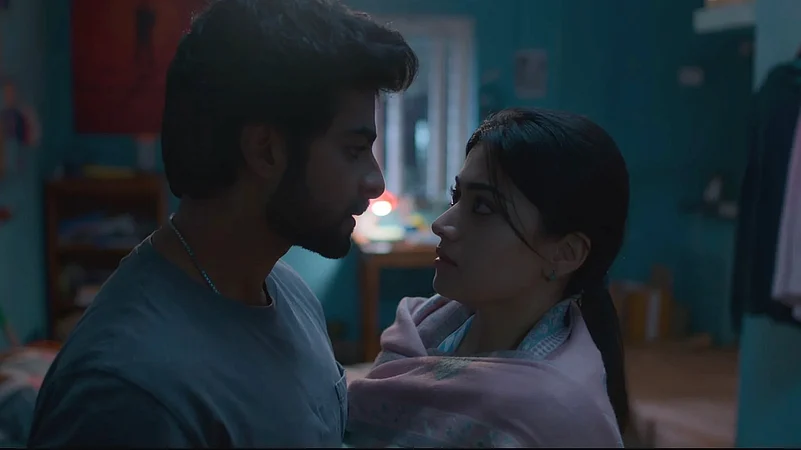
It takes place mostly within the confines of a college campus over the timespan of a couple of years. Bhooma Devi (Rashmika Mandanna) is an English literature student who has just moved to Hyderabad in pursuit of a degree and ambitions of a better life. Many have been calling it Mandanna’s career-best performance and rightfully so, as here she’s actually able to deliver her lines fluently, emote better and work around an actually well-crafted script.
Bhooma has her life planned out—study well, get a degree and get a good campus job placement. On the first day, she’s spotted by Vikram (Dheekshit Shetty), the college stud who’s instantly infatuated by her after seeing her on campus a couple more times. He threatens to beat up a police officer who stops her for driving on the wrong side of the road at night. It’s a familiar case of misplaced saviour complex, rooted in men exhibiting a vigilante-like masculine protectiveness toward women they consider “their own”, without really forging a genuine connection with them.
Bhooma is innocent, laidback and focused. She hails from another city and isn’t looking for romance—an important point to emphasise. Vikram consistently manipulates situations and convinces Bhooma that they’re meant to be together after a very awkward one-sided kiss. Familiar? In Animal, when Geetanjali (Mandanna) and Ranvijay (Ranbir Kapoor) first meet in school, he is deeply infatuated with her as well. However, years later when they meet, Geetanjali rejects him, saying she sees him as a brother-like figure, which humiliates and enrages him. This triggers a love-bombing cycle to cloud her judgement into making her believe she’s fallen for him; same as Preeti (Kiara Advani), who is “claimed” by Kabir (Shahid Kapoor) in Kabir Singh at first sight, without the need to ask her if those feelings are mutual.
In a scene from The Girlfriend, Vikram breaks into Bhooma’s apartment and notices her to-do list, which includes reading Virginia Woolf’s A Room of One’s Own (1929). He checks the book out from the library before she can—not to read it, but to use it as bait to make her talk to him. The moment sharply reflects how some men weaponise feminist literature as performative gestures of progressiveness to manipulate women. Consent is a slippery slope when inexperienced women first meet someone romantically. The Girlfriend portrays this moral fog women are prone to quite well.
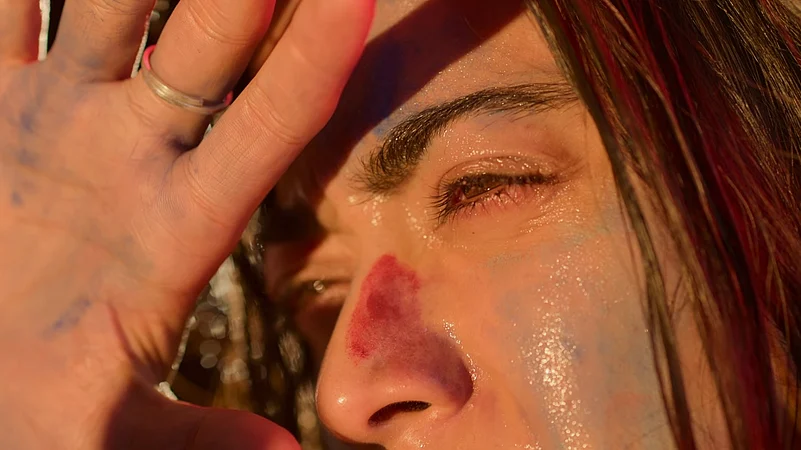
This trajectory from innocent lamb to fierce goddess is brought out brilliantly in the film. That it emerges through Mandanna, who previously played Geetanjali in Animal and couldn’t escape Ranvijay’s possessiveness, is an even more powerful statement. These women are first chosen, expected to fall in love eventually and accept the problematic behaviours that come with having a man who will supposedly protect them. The trade-off for that perceived safety is a frogs-in-simmering-water situation, where women don’t quite realise when they’ve lost all control over their own lives.
The core issue with gender roles in romance lies in how women have the passive role of being pursued, while men are expected to take every initiative. This dynamic often undermines a woman’s agency and consent. The film also captures this very idea that emotionally underdeveloped men rarely understand, or worse, rarely care whether the woman before them feels uncomfortable with their actions.
With conservatism resurging in recent years, many content creators now romanticise the ‘tradwife’ ideal through “life as a twenty-one-year-old wife” reels. This film feels like a sharp rebuke to those—including choice feminists—who fail to see what becomes of young women who haven’t lived long enough to know what they truly want. Or that not all choices made by women are inherently feminist—some are rewarded precisely for their compliance, for conforming to patriarchal structures disguised as “freedom of choice”, which is a result of generations of conditioning. Moments where Bhooma tends to Vikram—cleaning his room or bringing him lunch—reveal the vulnerability of young women still finding their footing, often yielding to those with louder, more dangerous voices.
The Girlfriend tackles many facets of womanhood at once. The most difficult one though, is how men, including those at home, have failed women time and again. Bhooma’s father (Rao Ramesh) is her sole guardian who guilt-trips, controls and keeps her freedom tied to a leash. Since childhood, her relentless struggle to please her father and get his approval leads her into isolation and disappointment.

Her HOD and English literature professor, Sudhir (director Ravindran, in a cameo), embodies a filmmaker’s innate instinct to insert themselves into their film and protect their characters from tragic ends. Yet here, Ravindran doesn’t rescue or liberate Bhooma; she never even confides in him. Instead, he serves as a gentle anchor—offering a quiet insistence on her agency, education, and rekindling her lost spark. Bhooma’s attempt to get a degree is a trade off between being the compliant daughter and being an independent woman. The fact that this is a reality for many women in India, is heartbreaking, especially considering they’re not welcome at home and even beyond. So where should women go?
The answer lies in Ravindran’s attempt at interjecting the importance of female friendships and creating spaces where they feel safe, as the way to achieve true independence and happiness. Durga (Anu Emmanuel), a previous love interest of Vikram, is outgoing, seductive, stylish and unapologetic about what she wants, unlike Bhooma. Instead of pitting one kind of a woman against another, the film allows for them to bond over theatre as she helps Bhooma develop her acting skills. The nervous, shy and timid girl transforms into a brute force of nature on stage with Durga’s friendship.

What is remarkable about the portrayal of Durga is that the film could have easily written her off as a “promiscuous distraction” to the hero; instead, it humanely positions her as a rational and emotional person who can see right and wrong beyond romance. The film also explores the contrasting ways men and women perceive friendship. Men often depend on their peers for validation and approval, even when it reinforces problematic behaviour, as seen with Vikram, whose actions are excused because they serve a shared interest in keeping women “in check.” In contrast, female friendships tend to be rooted in safety, respect, and accountability.
A very potent paradox of absence within presence is the crowd: loads of people witnessing abuse, harassment and violence. They’re even recording it all on their phones but never reacting, never speaking up. The loneliness of women in such social situations is palpable and truly highlights why they shouldn’t seek their fickle validation at all.
The crux of the problem is that Vikram is an ineffectual mama’s boy, whose unresolved attachment to his mother (Rohini) has warped into an ugly romantic trope. When Vikram tells Durga, “girls like her aren’t his type,” he says it the way most over-coddled, raja-beta Indian men do: they sleep with one kind of woman but choose to marry someone resembling their meek, near-silent mothers—lest they invite the “belt treatment.” For a control-freak “alpha-male” to be humiliated and shown as a villain feels like a massive victory for Telugu cinema. The Girlfriend doesn’t seek to write men off, but to hold up a mirror, revealing why women must reserve trust, faith, and love for those with integrity, emotional intelligence, and self-worth rooted in personal growth, not in controlling women.
Mandanna’s portrayal of Bhooma is near flawless—a brilliant embodiment of female rage and generational trauma channelled into a woman breaking free from male disappointment to find her own voice. The cinematography is technically sound and isn’t anything out of the ordinary but certain moments involving the externalising of her psyche really stand out. Through a series of symbolic scenes capturing the claustrophobia and fear of being restrained from her full potential, the film empowers her—and women like her—to reclaim their identity, education, sexuality, and independence. Overall, The Girlfriend is a film that will be referenced for years to come, as its relevance feels both timeless and timely. It’s especially refreshing to see this perspective coming from a male director and hoping this prompts better scripts written for women and better roles for Mandanna to explore her range.








